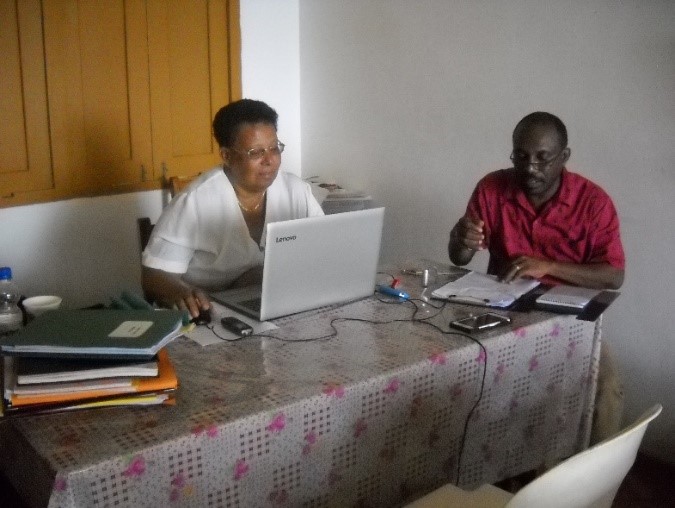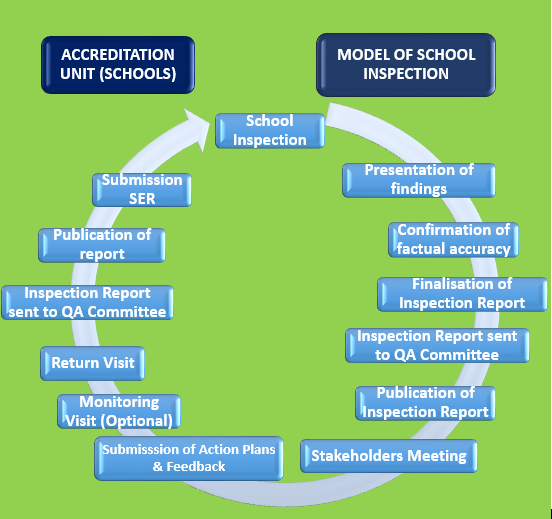Members of the Unit during an inspection
Mission
The mission of the Inspectorate Unit is to provide an inspection service to the Ministry of Education and Primary /Secondary schools to raise the quality of education received in Seychelles, by improving the quality of the schools' self-evaluation processes and by setting standards to enhance the quality of education for all children in Seychelles.
The Aim
The main aim of the Inspectorate unit is to inspect all Primary and Secondary State Schools against established standards and performance indicators and report to the schools and Ministry of Education for monitoring, support and follow-up actions.
In line with SQA’s mission, the School Inspection Unit’s main aim in inspecting primary and secondary schools is to boost the quality of the services they offer, particularly in teaching and learning, and consequently raise the quality of education provision. This Unit is also responsible for setting standards to guide schools to improve the quality of their self-evaluation processes thereby eliciting the setting and implementation of realistic improvement targets to enhance the quality of education for the children in Seychelles.
Operational Principles
- Openness and Transparency - valuing a collaborative approach
- Comprehensiveness - Conditions associated with 'effective' schools
- Capacity Building - with a focus on Self Evaluation
- Focus on Learning - progressive improvement in attainment / achievement / quality assurance and development planning
- Formative Emphasis - improvement is data driven
- Confidentiality - reports restricted to those services having a direct responsibility for school supervision and support
Roles & Responsibilities
- To work with schools to keep performance indicators and evaluation criteria under review
- To work closely with management teams and services in Schools Division to monitor and support the development of structures and processes for self- evaluation in schools
- To analyse data from examinations and evaluation reports with a view of helping schools to set targets for improvement particularly for attainment
- To evaluate the performance of schools against agreed performance indicators and targets and give feedback to the school
- To publish outstanding practices
- To monitor the provisions of quality education in all state schools through evaluation and monitoring in compliance with the Education Act 2004
- To evaluate, educate and advise Senior Management Teams, Schools Councils and teachers on good implementation of Schools' Development Plans & day to day running of the school
- To approve the recruitment, training and deployment of part-time EQA team members
- To recommend points for actions and strategies for improving the quality of basic education
- To report to the MOE, School Councils and schools on the accountability and the effective use of resources in schools.
Inspection Diagram
Types of Inspection
1. Whole School Inspection
This is a comprehensive assessment which examines all the six key areas as per the framework.
2. Short Inspection
This form of inspection is partial and focuses on a limited number of predetermined aspects of a school based on the school SER analysis.
3. Return / Monitoring Visits
The focus will often be dictated by the need to monitor progress in respect of a particular area of concern identified through a previous inspection.
4. Special Inspection
Special Visits can be:
* The Confirmation of Good Practice (to confirm individual members of staff as models of good practice)
* Follow up or monitoring visits to schools which are not performing to standard.
* To investigate and report on a specific issue of concern identified by officers.
* Investigative visits carried out with a limited focus in a specific institution:
(i) in response to complaints from parents, School Council, other agencies within or
outside the school community regarding a particular situation, and
(ii) as directed by the SQA Board or at the request of the Ministry of Education.
The purpose of the inspection is to arrive at a valid judgement or resolution to a conflict.
Code of Conduct for Inspection Officers
Inspectors should:
- Evaluate objectively, be impartial and evaluate without fear or favour
- Evaluate provision in line with frameworks, national standards or requirements
- Base all evaluations on clear and robust evidence
- Report honestly and clearly ensuring that judgements are fair and reliable
- Carry out their work with integrity, treating all those they meet with courtesy, respect and sensitivity
- Endeavour to minimise the stress on those involved in the evaluation
- Act in the best interests and well-being of service users
- Maintain purposeful and productive dialogue with those being evaluated, and communicate judgements clearly and frankly
- Respect the confidentiality of information, particularly about individuals and their work
- Respond appropriately to reasonable requests, and advise the Ministry on appropriate action safeguarding health and safety issues
- Be accountable for their decisions and actions to the school and stakeholders when reporting on the school concerns
- Be as open as possible about all the decisions and actions that they take
- Dress appropriately in a way that upholds the good reputation of the SQA, Ministry of Education and the teaching profession.
Inspectorate Manual version 3, 2014
Seychelles early learning framework


